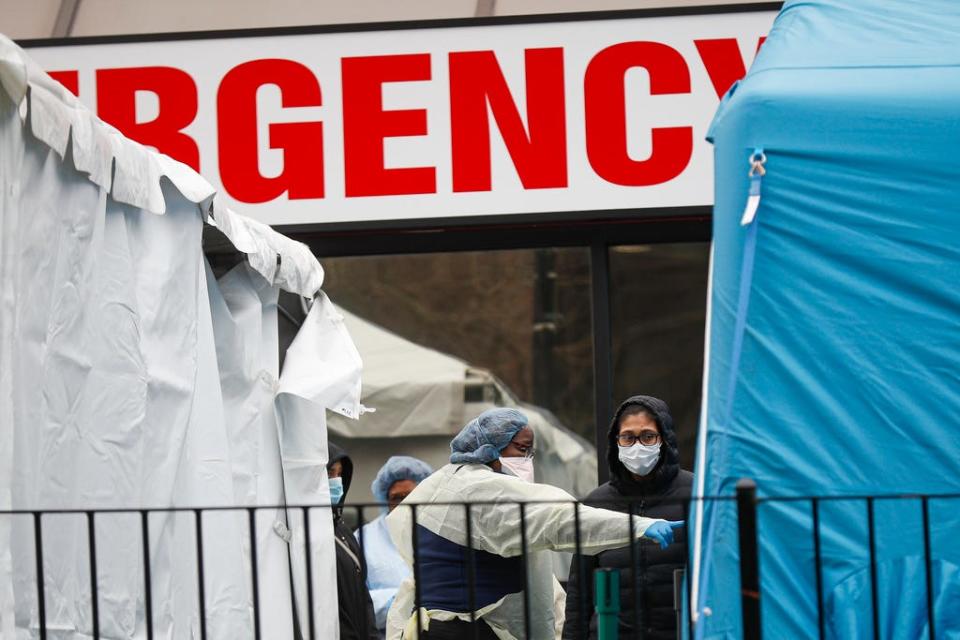Stop elective surgeries now and convert operating rooms to ICUs to fight coronavirus
Our hospitals have been kept at almost capacity because an empty bed is not generating revenue, and hospitals need to remain profitable to stay open. Now that we face a pandemic, we will quickly run out of the critical care beds and equipment required to treat the worst the coronavirus has to throw at us, leaving doctors with only terrible choices.
We can take action now to save lives, by forcing more hospitals and surgery centers to cancel unnecessary operations and repurpose their equipment and the appropriate people to help treat coronavirus patients.
It’s well documented that the critical equipment in this fight is the ventilator, and our supply is woefully inadequate. But we do have a readily available and essential backup that can be at the ready: Hospitals and surgery centers have numerous anesthesia machines that can double as intensive care ventilators. There are as many as 70,000 of these devices in American hospitals, according to Dr. Mary Dale Peterson, president of the American Society of Anesthesiologists. In addition, there are likely tens of thousands more in ambulatory surgery centers across the country.
By shutting down all but the most urgent surgeries, hospital operating rooms and surgery centers should repurpose those resources as critical care units, adding to the supply of this vital equipment and saving lives.
We need a nationwide order
Although some leading institutions are doing the right thing by canceling all nonemergency surgeries, some very large for-profit health systems are attempting to continue business as usual. One hundred and thirty surgery centers at HCA Healthcare, and even academic medical centers such as the University of California at Davis are still performing elective procedures.
Some of them say the decisions about which surgeries will go ahead is between the surgeon and patient. However, financial incentives for these centers and the understandable desire for the patient to receive care make that decision extraordinarily difficult. Some of these procedures are needed, the sooner the better, but with so much at stake with coronavirus, addressing what is needed right now is paramount.
Our view: With coronavirus pandemic raging, it would be insane to kill Obamacare
Some centers falsely reassure patients that they regularly treat patients with infectious diseases in the coronavirus information on their web sites. But do they regularly have potentially hundreds or thousands of people moving through their facilities carrying a novel deadly virus that many of us don’t even know we are spreading?
While the decision to close these centers is difficult, it is irresponsible to continue with surgeries that can be delayed because of the unnecessary waste of protective equipment such as masks, and the risk to the health care providers who are our greatest weapon in the fight against coronavirus.
I applaud the handful of states such as New York, Colorado, Florida, Minnesota, Ohio and Washington that have prohibited nonessential and/or elective surgery. But they have left the language ambiguous enough that providers can exploit and abuse the intention of the order. “Nonessential” and “elective” must be spelled out explicitly in legislation or an executive order at the federal level.

One side effect of canceling nonemergency surgeries is that the people who normally staff the surgery centers and operating rooms will be out of work. Some of the staff, such as anesthesiologists, certified nurse anesthetists (CRNA), anesthesia assistants (AA), surgeons, technicians and nurses, are skilled in patient care and using the equipment, but may not feel comfortable as intensive care providers.
New techs can help
But we should use the skills these workers do have and train them quickly to be effective in fighting this deadly disease. By working with hospitals, surgery centers and their staff, we can convert most operating rooms and other areas of the hospital (e.g. interventional radiology suite, catheterization lab, endoscopy unit) to critical care space without the need to build anything new. Not only will that provide us with an increased supply of ventilators and a ready and willing staff that presently has no work, and wants to help, but it will also preserve the precious masks, gowns and eyewear that help keep our medical providers safe.
ICU doctor: Coronavirus frightens me. It's severe, unpredictable and it has no cure.
Furthermore, we can now use newer technologies such as telehealth systems that allow doctors in high demand to see digital data remotely, effectively creating more specialists where needed. Additionally, the cameras included in these systems can transmit data from ventilators and monitors to critical care experts to make decisions and help staff in real-time. They are already in use in some facilities and could be deployed in a manner of days and will empower us to address geographic surges in coronavirus, allowing providers from anywhere to assist where the need is greatest.
Operating rooms will still be available for legitimate emergency surgeries. Surgery centers are never used for emergency surgery, and excess hospital operating rooms can be converted to critical care for multiple patients, while maintaining our usual capacity for accident victims and patients in critical condition from something other than coronavirus.
Every nonemergency surgery center or office with an anesthesia machine that is converted to dealing with coronavirus will save lives. We don’t have a second to waste.
Dr. Adam Schlifke is a board-certified anesthesiologist and clinical assistant professor at the Stanford School of Medicine. Follow him on Twitter: @schlif
You can read diverse opinions from our Board of Contributors and other writers on the Opinion front page, on Twitter @usatodayopinion and in our daily Opinion newsletter. To respond to a column, submit a comment to letters@usatoday.com.
This article originally appeared on USA TODAY: To fight coronavirus, we should stop elective surgeries and convert ORs to ICUs

